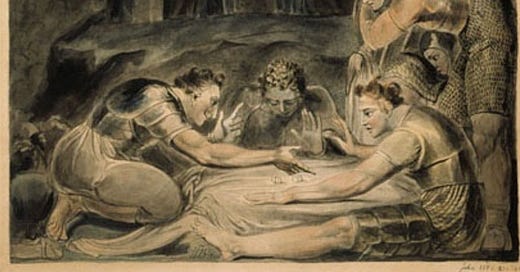Waiting For Godot: Good Friday
The experience of the aporia involves a suspension between what is known and what is not known. Aporias are therefore perplexing and strewn with uncertainty. In Waiting for Godot, Vladimir quickly establishes that ‘Nothing is certain.’ In the opening pages of this play, the validity of truth is questioned, and the concept of death becomes uncertain. We see this uncertainty when Vladimir asks, ‘how is it that of the four Evangelists only one speaks of a thief being saved.’ Vladimir is speaking about the many gospel stories about the two thieves that were crucified on crosses either side of the messiah, in this case, Jesus of Nazareth. It is worth mentioning here that the thief on the left was named Gestas. Gestas was impenitent and said to have been damned. On the right of Jesus was Dismas, the penitent thief and it was told that he was saved. In the Gospel of Luke, it is written that Jesus promised Dismas that he would be with him the same day in Paradise. When Estragon asks what he means by saved, Vladimir responds: ‘From death, from death.’ We might consider that one of the thieves was saved from death, by death. As the words ‘from death’ are repeated in the same sentence, it signifies a double, contradictory imperative. In Aporias, Derrida tells us that a double, contradictory imperative is a feature of an aporetic experience. ‘From death, from death’ implies an encounter of death with death. This confronting of death with death is an unexperienced experience, between what comes and goes, but as the same. An encounter like this is befitting only to the impossible. Derrida explains in Aporias that ‘death is always the name of a secret, since it signs the irreplaceable singularity.’ Death marks the singularity of this unique event. Estragon takes this possibility of an impossibility in his stride when he rhetorically questions: ‘Well, what of it?’ Vladimir reconsiders and presents the opposing logic: ‘Then the two of them must have been damned.’ ‘Everyone’ believes one version of the truth because it is the only story they know, Vladimir reasons. Calculating possible truths leads Vladimir to propose an impossible simultaneity — that both thieves were saved. Beckett’s use of a double, contradictory imperative: ‘From death, from death,’ is subtle and yet effective in creating a suspension between what is known and what is not known. It remains uncertain whether both thieves were damned by being saved or saved by being damned.
Image: William Blake, The Soldiers Casting Lots for Christ’s Garments, 1800. (pen, indian ink, grey wash and wc)




